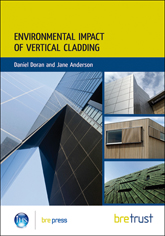
Environmental impact of vertical cladding Downloadable Version
This report reviews how external wall cladding materials have been assessed within The Green Guide to Specification, including the application of the Environmental Profiles methodology which underlies The Green Guide data. The way in which cladding is addressed within building-level environmental assessment schemes such as BREEAM and the Code for Sustainable Homes is also explained.
The report will give manufacturers and specifiers a general understanding of the significant benefits and impacts of external wall cladding products over their whole life cycle and help to identify opportunities for improvements to their environmental performance.
It is part of a series that provides comparable information on insulation, floor finishes, windows, metals, timber, masonry and concrete to assess the environmental impact of specific construction materials.
Glossary
1. Introduction
Life Cycle Assessment, Environmental Profiles and The Green Guide
2. How the Environmental Profiles methodology has been applied in relation to cladding
Data sources. Treatment of recycled inputs. Treatment of renewable inputs. Treatment of minerals extraction. Special cases. Functional units for environmental impact assessment. Assessment of insulation. Influence of primary structure. Influence of support secondary structure. Transport in the supply chain. Installation and construction impacts (non waste). Relevance of operational environmental impacts. Service life and durability. Treatment of waste. Treatment of recycling at end of life
3. Key impacts for cladding and opportunities for reducing environmental impact
4. Progress with reducing environmental impact
Where more data are required
5. Conclusions
6. References
Appendix: Defining cladding terms used in The Green Guide to Specification
A4 16pp
